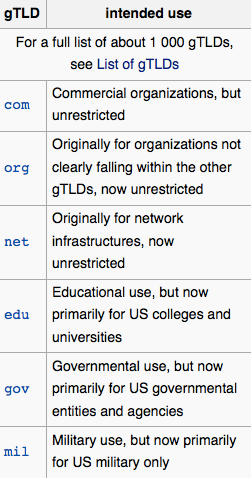The recent outcry over the new dot-sucks (.SUCKS) generic top-level domain (gTLD) portrays a U.S. government that has failed everyone, even as the bureaucracy divests control over the Internet Corporation for Assigned Names and Numbers (Icann).
Generic top-level domains were specifically purposed for websites in the beginning, or that’s the common misconception world-wide-web dinosaurs cherished about the same time Al Gore was inventing the Internet:
 Dot-com (.COM) for business
Dot-com (.COM) for business- Dot-net (.NET) for networking
- Dot-org (.ORG) for non profits
- Dot-edu (.EDU) for schools
- Dot-gov (.GOV) for governments
- Dot-mil (.MIL) for military
- Dot-xxx (.XXX) for porn
The failed U.S. conspiracy to control domains has gone on for more than two decades, led by the U.S. Commerce Department’s efforts to bring order to Icann, the domain name management organization who has ignored calls from Congress to ban the proliferation of useless names again and again. There are currently approximately 850 gTLDs, or domains, for the market to consider.
An embarrassed Senate Congress chairwoman Edith Ramirez recently elucidated their failure to organize the destiny of domain names on the Internet:
“The Commission provided Icann with policy recommendations in which we highlighted a range of issues implicated by the impending rollout of the new gTLDs, including the increased risk of consumer confusion …. I therefore urge Icann to consider ways in which it can address the concerns raised with respect to .SUCKS, as well as to consumer protection issues more generally, on a broader basis.”
– Senate Congress chairwoman Edith Ramirez
Both free-market and libertarian minded pundits are disparaging over the .SUCKS debacle just the same, realizing the mean-spirited and offensive circumstances Icann unleashed in their efforts to enrich themselves with more revenue.
“Developers, engineers and other Internet stakeholders were free to build the open Internet because ultimate U.S. control ensured its smooth operation. If Icann can’t fulfill its basic function of overseeing Internet names without U.S. oversight, there’s no way it can protect the Internet from authoritarian governments such as Russia and China trying to close down websites they don’t like.”
– L. Gordon Crovitz in The Wall Street Journal on June 1, 2015
The counterargument
Others conclude that by limiting domain names there simply is not enough inventory to supply the free market. Recent domain sales in the month of May demonstrate just how lucrative the market is when inventory is limited:
| gTLD | Domain Name |
Sold For | Where Sold |
| 1. | Mera.com | $132,500 | Private |
| 2. | Adopting.com | $125,000 | DomainHoldings |
| 3. | FBET.com | €50,000 = $54,500 | Sedo |
| 4. | MyFood.com | $33,500 | Sedo |
| 5. | WJM.com | $33,000 | Private |
| 6. | BD.net | $29,500 | Sedo |
| 7. | LILV.com | $28,000 | eNaming |
| 8. | Astrology.tv | €25,000 = $27,250 | Sedo |
| 9. | 8255.com | $26,500 | Sedo |
| 10. | EasyFundraising.co.uk | $24,000 | NoktaDomains |
| 11. | AttorneyGroup.com | $20,000 | Sedo |
| 12. | Bando.com | $19,999 | Sedo |
| 13. | 5227.com | $18,000 | DomainsNext |
| 14. | IMX.com | $17,500 | Sedo |
| 15. | Buji.com | $16,000 | NoktaDomains/4.cn |
| 16. | Macfarlane.com | £10,000 = $15,300 | Sedo |
| 17. | Hi.net | $15,000 | Sedo |
| 18. | Paris24.com | $11,000 | Sedo |
| 19. tie |
CZ.cc | €10,000 = $10,900 | Sedo |
| 19. tie |
Joy.eu | €10,000 = $10,900 | Sedo |
DN Journal follows the domain market and gathers trends. Any 3-letter .coms have been selling very high in 2015, but what is also interesting is the number of .net and .tv sales documented during the month. It’s only a matter of time until four-letter .coms become as lucrative to buy and sell as the lesser number letters.
Even if there were enough domain names, freedom of expression should allow for any gTLD, right? Well, not exactly. Freedom of speech (at least in the United States) does not include the right to be a jerk. The .SUCK domain would directly incite those who are targeted. A visit to www.uscourts.gov suggests obscenity and hate is illegal:
- [It is llegal] to incite actions that would harm others (e.g., “[S]hout[ing] ‘fire’ in a crowded theater.”). Schenck v. United States, 249 U.S. 47 (1919).
- [It is llegal] to make or distribute obscene materials. Roth v. United States, 354 U.S. 476 (1957).
Slander seems peanuts where national security is concerned. Disrupting business over the Internet would be an act of war. DNS hijacking may seem an act of terrorism when done by a rogue perpetrator, but subversion by a country or large organization is something else. As recently reported in the New York Times Magazine, Russia employs hundreds of trolls and troublemakers who could easily be repurposed to disrupting gTLDs:
Several Russian media outlets have claimed that the agency is funded by Evgeny Prigozhin, an oligarch restaurateur called “the Kremlin’s chef” in the independent press for his lucrative government contracts and his close relationship with Putin …. One Russian newspaper put the number of employees at 400, with a budget of at least 20 million rubles (roughly $400,000) a month.
– Adrian Chen, The New York Times
There will be continued debate whether the U.S. government – or any independent oversight paradigm – has the ability to manage ICANN and the dynamics of the evolving domain markets given the failed U.S. conspiracy to control domains.


